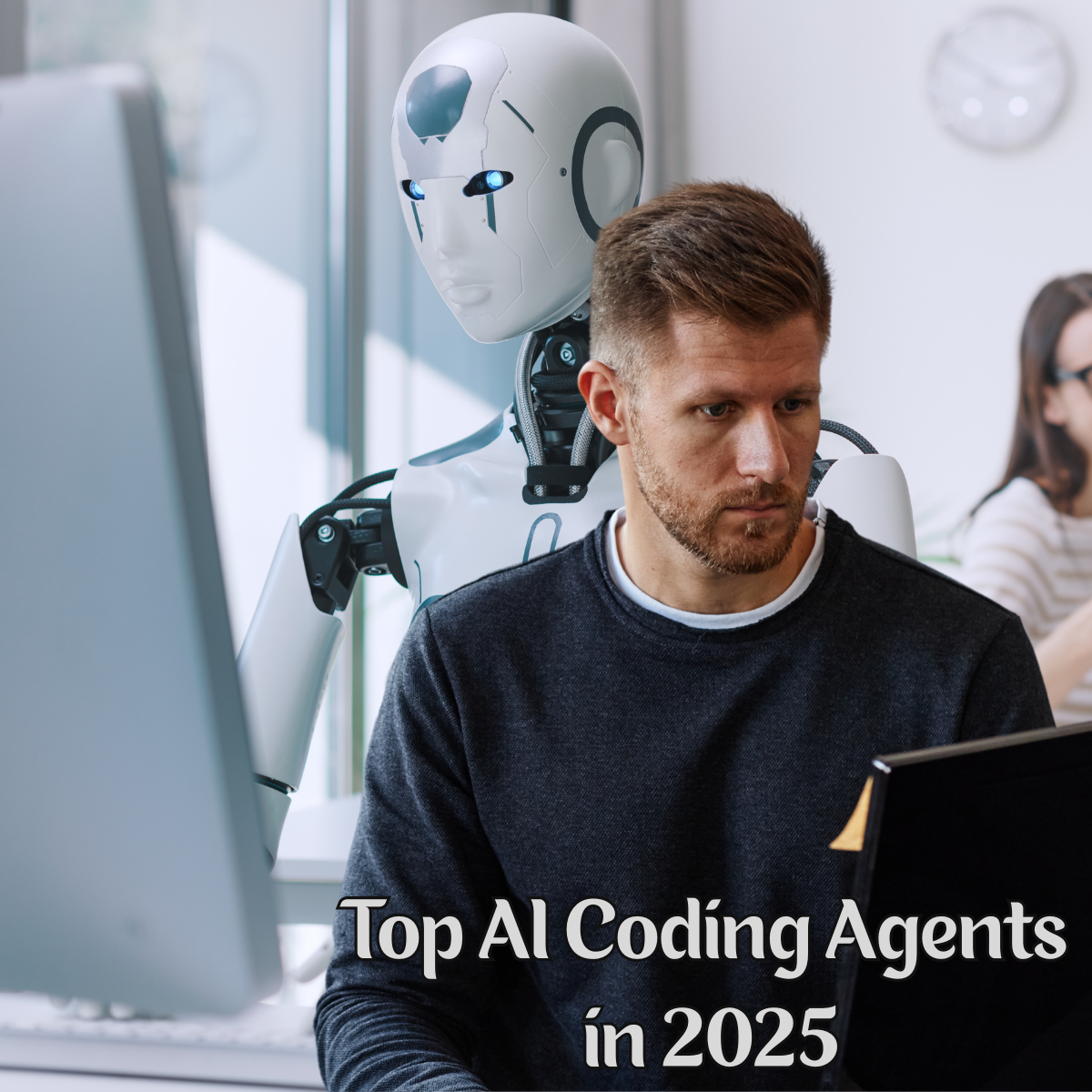Posted At: Aug 14, 2025 - 912 Views

Top AI Coding Agents in 2025: Revolutionizing Software Development
As of 2025, AI coding agents have evolved from simple autocomplete tools into powerful, autonomous collaborators that transform how developers write, test, and maintain code. These intelligent assistants not only generate code snippets but also handle complex workflows such as multi-file edits, automated testing, bug fixing, and even pull request reviews. This blog explores the top AI coding agents dominating the landscape in 2025, highlighting their unique features, strengths, and ideal use cases.
1. GitHub Copilot: The Smartest Pair Programmer
GitHub Copilot remains a dominant force in AI coding assistance, continuously evolving with integrations of multiple AI models including OpenAI’s GPT-4o and Anthropic’s Claude 3.5 Sonnet. It acts as a virtual pair programmer, offering context-aware code completions and interactive chat support inside popular IDEs like VS Code, JetBrains, and Neovim.
Key Features:
- Contextual code generation: Writes entire functions from comments or partial code, significantly reducing boilerplate coding.
- Adaptive learning: Improves suggestions based on your coding style and team patterns.
- Privacy and deployment options: Supports on-premise and private cloud deployments for security-conscious organizations.
- Additional capabilities: Generates documentation, commit messages, and explains code behavior interactively.
Copilot is best suited for developers seeking a versatile AI assistant that integrates seamlessly into existing workflows and supports a broad range of programming languages.
2. Codeium: Open-Source and Free AI Assistant
Codeium has gained popularity for its open-source commitment and robust coding assistance, offering real-time suggestions, debugging help, and refactoring support across more than 70 programming languages. Its collaborative development model ensures continuous improvement and adaptability.
Key Features:
- Free and open-source: No subscription barriers, making it accessible to startups, students, and budget-conscious developers.
- Real-time debugging and refactoring: Optimizes code structure and fixes bugs on the fly.
- Multi-IDE support: Works well with VS Code, IntelliJ, and PyCharm.
- Community-driven evolution: Frequent updates based on global user feedback.
Codeium is ideal for developers who want a powerful AI assistant without cost constraints, especially those who value transparency and community collaboration.
3. Cursor: AI-Augmented IDE with Agentic Capabilities
Cursor is more than a coding assistant—it’s a full-fledged AI-powered IDE built as a fork of VS Code, integrating deep AI capabilities directly into the development environment. It offers an agent mode where developers can set high-level goals, and Cursor autonomously generates, edits, and iterates on code files, including running and testing code.
Key Features:
- Built-in AI chat and code generation: Supports multi-file refactors and complex code generation tasks.
- Familiar VS Code interface: Low switching cost for developers already accustomed to VS Code.
- Agentic approach: Attempts to complete entire coding goals with minimal human intervention.
- Subscription-based: Targeted at power users who want an AI-first development experience.
Cursor is perfect for developers who want a tightly integrated AI coding environment that goes beyond suggestions to autonomous coding assistance.
4. Devin: Autonomous AI Software Engineer
Devin by Cognition AI represents the cutting edge of autonomous AI coding agents, functioning as a complete software engineer within a controlled cloud environment. It can execute natural language commands, plan implementations, search online resources, and fix bugs autonomously.
Key Features:
- Multi-agent coordination: Handles complex workflows by coordinating multiple AI agents.
- Autonomous bug fixing: Early benchmarks show nearly 14% of bugs fixed without human intervention.
- Cloud sandbox environment: Ensures security and controlled execution.
- Wide task range: From rapid website creation to deploying machine learning models.
Devin is suited for organizations prioritizing autonomous development capabilities and cloud-based workflows, though it may be less flexible for teams needing local control or working with sensitive codebases.
5.Qodo: The Quality-First AI Coding Platform
Qodo stands out as the premier AI coding assistant in 2025, renowned for its precise code suggestions and automated test generation capabilities. It excels at improving code quality by generating tailored recommendations that include docstrings, exception handling, and adherence to best practices.
Key Features:
- Automated unit test generation and coverage: Ensures thorough testing by covering all possible code behaviors and seamlessly integrating test cases into the source code.
- Code explanation and documentation: Breaks down complex code snippets with detailed descriptions and usage examples, aiding comprehension.
- Collaboration-friendly: Git integration and the Qodo Merge PR-Agent Chrome extension enhance pull request reviews with AI-driven feedback, reducing review time.
- Multi-language and IDE support: Compatible with Python, JavaScript, TypeScript, and integrates with popular IDEs like VSCode, JetBrains, and PyCharm.
Qodo’s intelligent auto-completion aligns with task plans, streamlining the entire coding process from start to finish. It is ideal for teams focused on code quality and automated testing at scale.
6. Zencoder: AI Coding Agent with Multi-File Editing and Testing
Zencoder offers a comprehensive AI coding assistant that automates the entire development lifecycle with advanced features like multi-file editing, unit test generation, and AI-powered code repair. It integrates with over 20 developer environments, making it highly versatile.
Key Features:
- Seamless bug fixing and refactoring: Automates tedious debugging and complex code repairs.
- Docstring and documentation generation: Improves code maintainability through AI-generated documentation.
- Agentic AI chat: Provides real-time, code-aware guidance and tailored recommendations.
- Side-by-side diff views: Allows developers to accept or reject AI-proposed multi-file changes with full context.
Zencoder is ideal for teams seeking a robust AI assistant that can handle broad codebase modifications and maintain high code standards.
Emerging Trends and Outlook for AI Coding Agents in 2025
- From Assistance to Autonomy: AI coding agents are increasingly moving beyond simple code suggestions to fully managing workflows, including testing, code reviews, and deployment tasks.
- Hybrid Human-AI Teams: Developers are working alongside AI agents in hybrid teams, leveraging AI for repetitive or low-complexity tasks while focusing on strategic problem-solving.
- Specialization and Domain Fine-Tuning: AI agents are becoming more specialized for particular domains, programming languages, or industries, improving relevance and effectiveness.
- Ethical and Secure AI Use: Privacy, security, and ethical coding practices are central, with many tools offering on-premise deployment and strict data handling policies.
Conclusion
The AI coding agents of 2025 represent a transformative leap in software development productivity and quality. From Qodo’s quality-first approach and GitHub Copilot’s versatile pair programming to Devin’s autonomous engineering and Cursor’s AI-first IDE, developers have a rich ecosystem of intelligent tools to choose from. Selecting the right AI assistant depends on your team’s needs—whether it’s open-source flexibility, autonomous capabilities, deep IDE integration, or comprehensive lifecycle automation.
